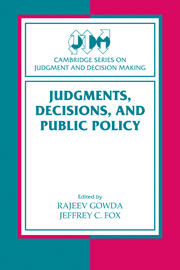Book contents
- Frontmatter
- Contents
- Contributors
- Acknowledgments
- Introduction
- Part I The Fundamentals of Behavioral Decision Theory
- Part II Economic Applications and Contrasts
- 4 Policy Analysis and Design with Losses Valued More than Gains and Varying Rates of Time Preference
- 5 Comparing Micro and Macro Rationality
- 6 Bounded Rationality versus Standard Utility-Maximization: A Test of Energy Price Responsiveness
- Part III Applications to Political and Legal Processes and Institutions
- Part IV Other Policy Applications
- Part V Commentary and Cautionary Note
- Index
4 - Policy Analysis and Design with Losses Valued More than Gains and Varying Rates of Time Preference
Published online by Cambridge University Press: 11 January 2010
- Frontmatter
- Contents
- Contributors
- Acknowledgments
- Introduction
- Part I The Fundamentals of Behavioral Decision Theory
- Part II Economic Applications and Contrasts
- 4 Policy Analysis and Design with Losses Valued More than Gains and Varying Rates of Time Preference
- 5 Comparing Micro and Macro Rationality
- 6 Bounded Rationality versus Standard Utility-Maximization: A Test of Energy Price Responsiveness
- Part III Applications to Political and Legal Processes and Institutions
- Part IV Other Policy Applications
- Part V Commentary and Cautionary Note
- Index
Summary
The use of economics in the analysis and design of public policy has enjoyed considerable success and approval, particularly among economists, and the call has usually been for more such analyses. However, recent research findings demonstrate that some important behavioral assumptions that form the basis of much current economic and policy analysis often provide neither a very good description of people's preferences nor very useful predictions of their reactions to real choices.
Although little use is being made of these behavioral findings, on present evidence the consequences appear substantial. Many analyses based on conventional assumptions may provide distorted guidance, and policy design may be materially improved with what now seem to be better readings of people's preferences.
There are several areas in which recent resultsshowpeopl's behavior to be at variance with commonly accepted assumptions. Many are the result of the context dependence of peopleés valuations of entitlements or of outcomes. Two of these, both of which illustrate the importance and range of policy issues potentially affected by these behavioral findings, will be discussed here. The first is the widely reported finding that people commonly value losses much more than otherwise fully commensurate gains-the reference state, or endowment, effect. The second is the less well documented, and somewhat related, evidence that people have varied rates rather than a single rate of time preference that they use to value and choose among future outcomes.
- Type
- Chapter
- Information
- Judgments, Decisions, and Public Policy , pp. 91 - 115Publisher: Cambridge University PressPrint publication year: 2001
- 1
- Cited by



